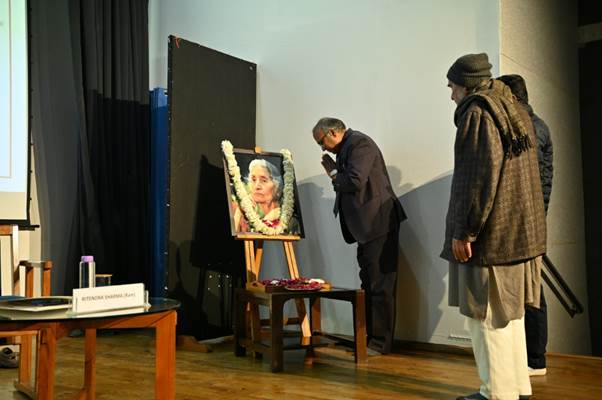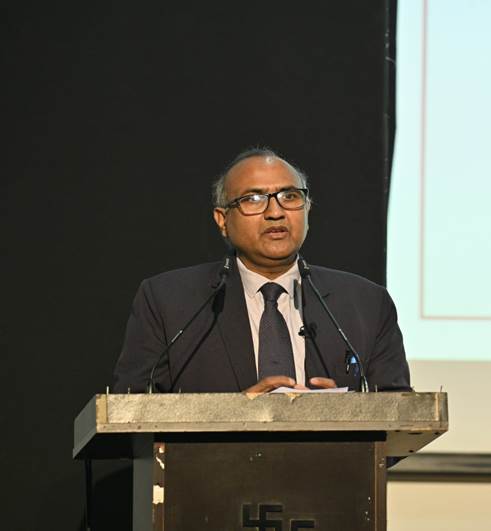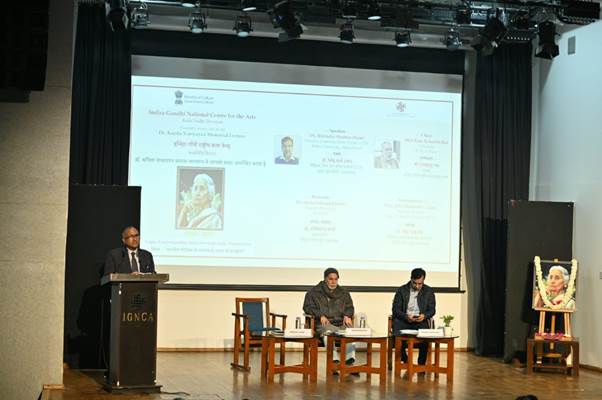Ministry of Culture
IGNCA Hosts Kapila Vatsyayan Memorial Lecture on India's Cultural Essence and Indic Knowledge
IGNCA Hosts Kapila Vatsyayan Memorial Lecture on topic 'Understanding India through Indic Perspective’
प्रविष्टि तिथि:
28 DEC 2023 5:51PM by PIB Delhi
The Kala Nidhi Division of the Indira Gandhi National Centre for the Arts (IGNCA) held the Kapila Vatsyayan Memorial Lecture, on an illuminating topic titled 'Understanding India through Indic Perspective'. Dr. Ritendra Sharma (Ram), the Director of the Centre for Indic Studies (CIS) at Indic University in Ahmedabad, delivered this insightful memorial lecture. Under the distinguished chairmanship of Shri Rambahadur Rai, President of the IGNCA Trust, the session was enriched by the presence of Prof. (Dr.) Ramesh C. Gaur, adding academic depth and insight to this esteemed gathering. The lecture delved deep into the heart of India's cultural ethos, providing profound perspectives on India's essence through the Indic lens.

Dr. Ritendra Sharma (Ram), addressing the audience, highlighted Kapila ji's prominent work in the field of Indic knowledge and the pivotal role of IGNCA, the institution she founded. He emphasized Kapila ji's journey as a seeker before becoming a revered guru, citing her blessings from prominent thinkers like Sri Aurobindo, Vasudev Sharan Agarwal, Pandit Madhusudan Ojha and Sri Anirvan.

Delving into 'Understanding India through Indic Perspective,' Dr. Sharma discussed five variables—cosmology, Sandhya Bhasha, Itihaas: Puranas, Dharma vs Religion, Binaries. During his lecture, Dr. Sharma asserted the implicit suggestion within the topic that we have yet to fully embrace India from an Indic perspective in its entirety. Drawing parallels between Western knowledge and the Indic system, he conducted a comparative analysis, unveiling the foundational trajectory of the Indic perspective. Richard Feynman's belief in the atomic hypothesis—where all things consist of atoms, tiny particles in perpetual motion, attracting when apart and repelling when compressed—stood in contrast to V. S. Suthankar's view within the Indian Knowledge system. Suthankar proposed that the ancient rishis of India aimed to unravel the complex web of individuality, essentially the miniature cosmos, to liberate captive energy for Nature's sublimation. Dr. Sharma also delved into Indic Cosmology, elucidating its manifestation through layers of consciousness and addressing the essence of the Indic Knowledge System—the journey from 'Purusha' (Primal Man) to 'Manava' (Mankind). Quoting Kapila ji, he stressed the cyclical nature of the cosmos and the educational essence of returning to our holistic origins. He highlighted the significance of understanding symbolic language, asserting its necessity to decode Indic knowledge beyond colonial literal interpretations. Additionally, he referenced Vedic texts to explain the theory of creation, citing Nasadiya Sukta, Purusha Sukta, Vishvakarma Sukta, Hiranyagarbha Sukta, and Devotpatti Sukta.
During the course of his lecture he asserted the symbolic language possesses a flexible quality, allowing for the decoding of multiple meanings. This characteristic is advantageous as it enables the presentation of a comprehensive realm of ideas using minimal and simple words. For instance, associating Earth with the concept of Motherhood offers a wealth of profound ideas applicable across various levels concerning plants, animals, and humans. The archetype of Universal Nature or Infinity embodies the essence of the principle of Motherhood.

Dr. Sharma expressed tribute to Kapila ji and said she pursued the understanding of India on its own terms, employing a methodology focused on reconstructing the whole from fragments. Her approach involved viewing individual expressions as integral parts of a unified whole, meticulously mapping the intricate interrelationships between various branches, much like delineating the exact routes on a tree. She sought to comprehend every ritual or practice within its cultural context. Her capability stemmed from a solid grounding in both theory (sastra) and practical application (prayoga). Her pursuit wasn’t about discovering something entirely new but rather about redefining and reconstructing the tradition by examining diverse fragments that constitute the whole.
During his introductory address at the lecture, Professor Ramesh Chandra Gaur extended a warm welcome to the esteemed speaker, the chair, and the audience. He acknowledged Dr. Kapila Vatsyayan, the esteemed founder Member Secretary of IGNCA, contributions towards IGNCA. It is noteworthy in this context that Kapila ji made significant contributions to IGNCA’s personal collection which comprises 11,000 books, 3,000 scholarly articles, as well as significant artefacts and sculptures. Prof. Gaur lauded Dr. Vatsyayan's unparalleled impact on the realms of art and culture, emphasizing her status as an institution within this field. Recognizing her exceptional accomplishments, he noted her Padma Vibhushan accolade from the Government of India, a clear affirmation of her extraordinary dedication to the field of Indian art and cultural landscape.
***
SKT
(रिलीज़ आईडी: 1991282)
आगंतुक पटल : 1109